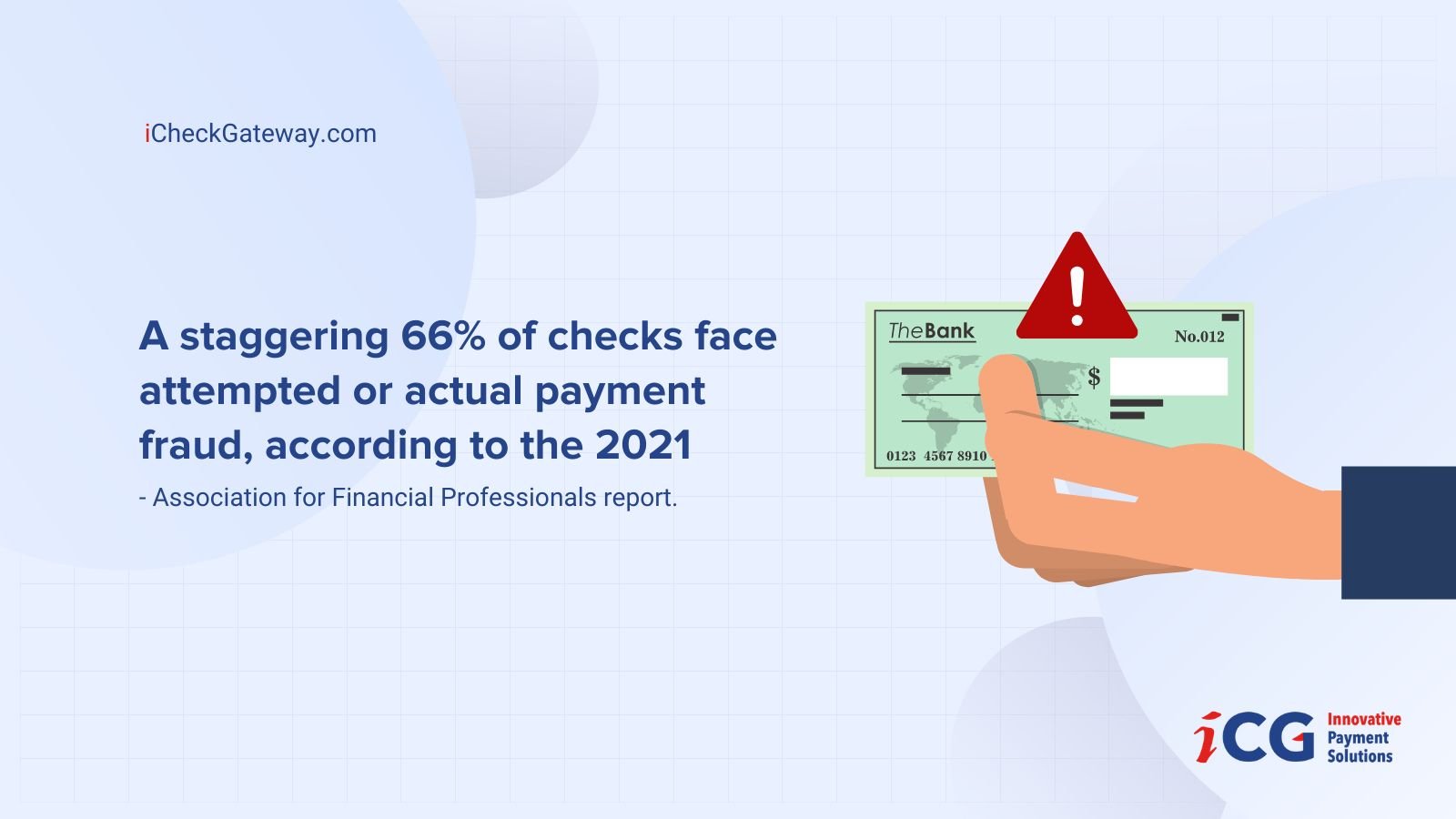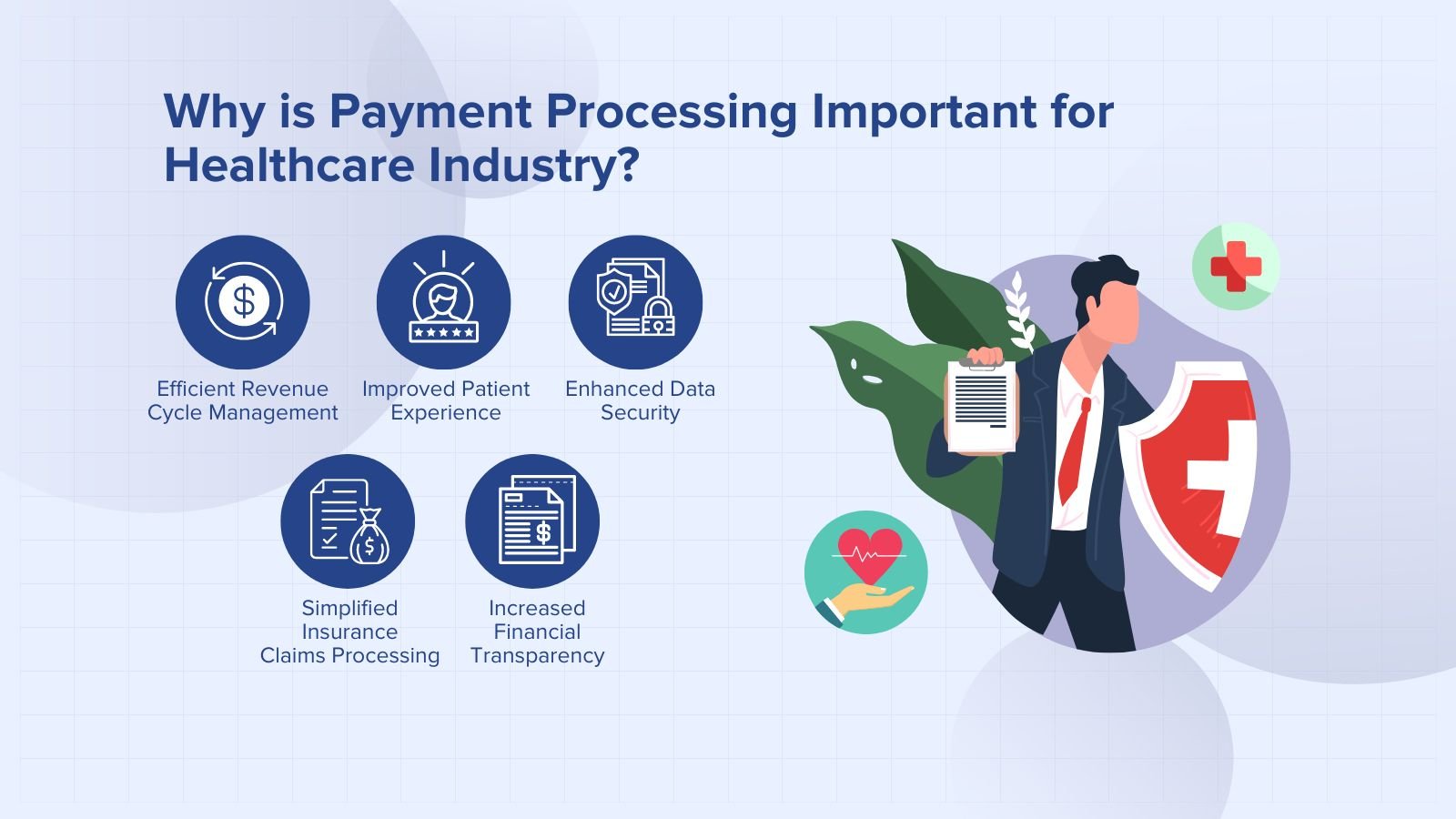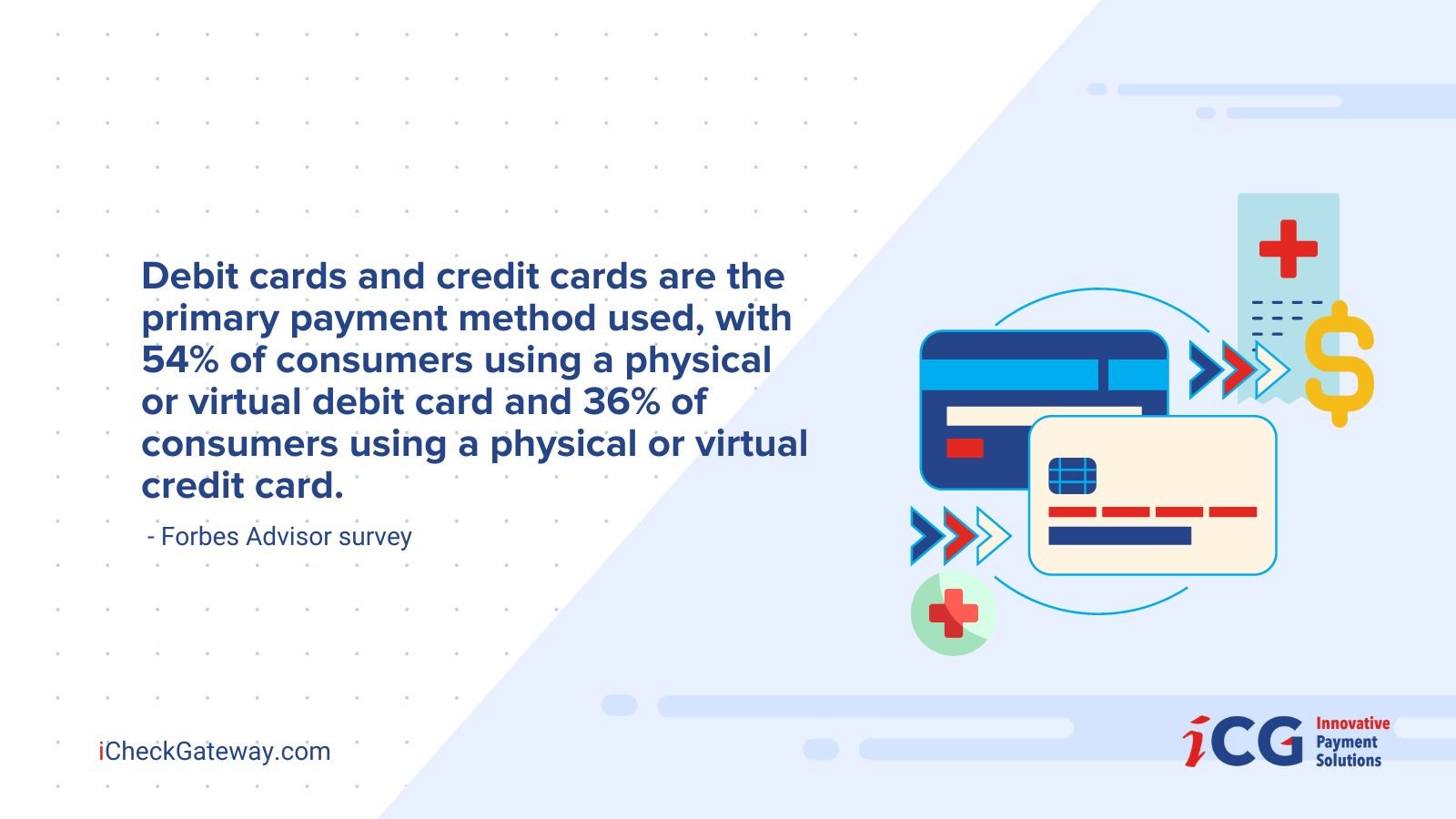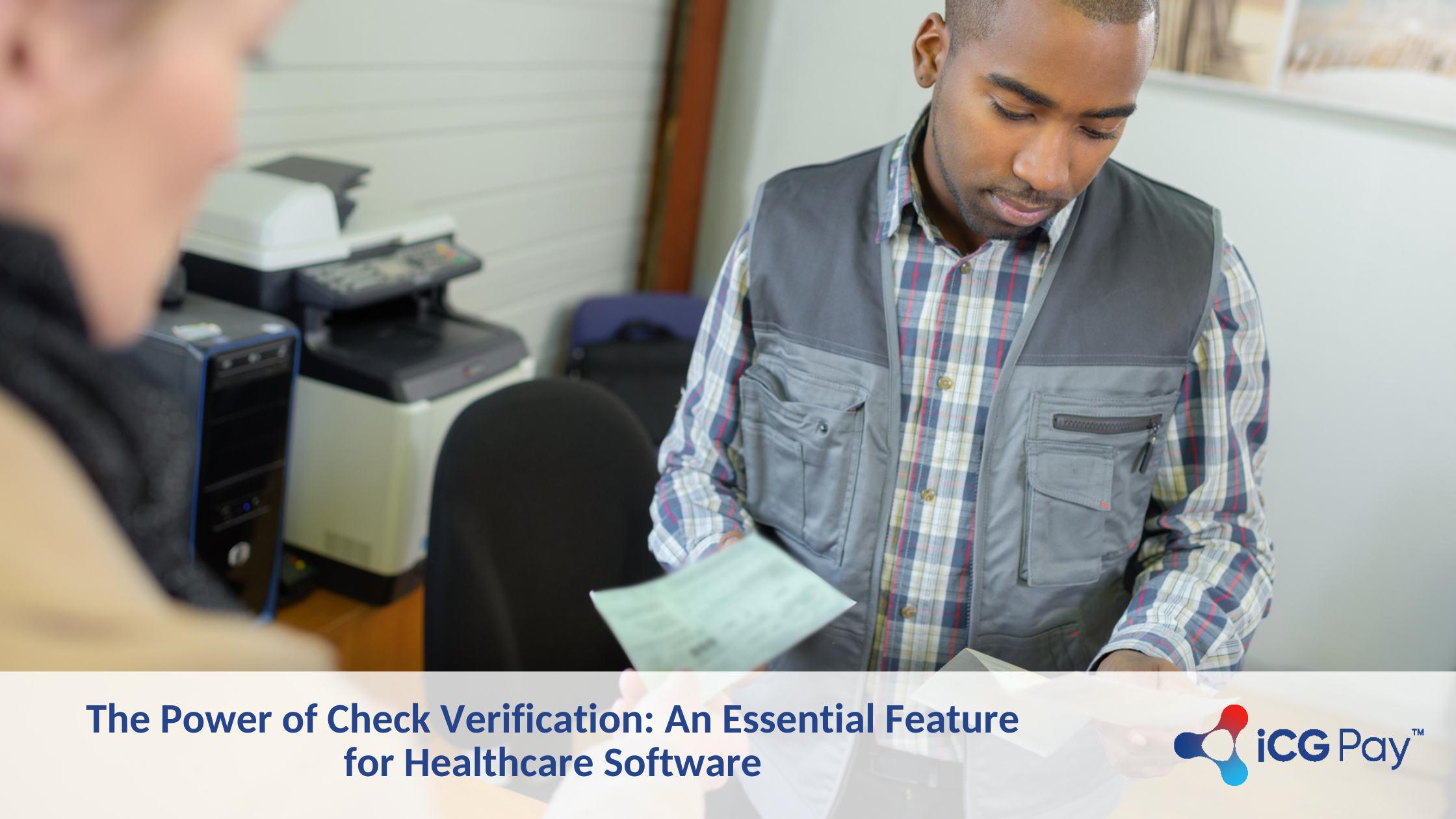A staggering 66% of checks face attempted or actual payment fraud, according to the 2021 Association for Financial Professionals report.
Additionally, check fraud attempts soared to $15.1 billion in 2018, up from $8.5 billion in 2016, accounting for 60% of attempted fraud against deposit accounts at U.S. banks.
Fraudsters are becoming increasingly skilled at exploiting digital channels.
With this ongoing digital revolution, you can’t afford to fall victim to the rapidly advancing world of cybercrime. Therefore, you need to have robust check verification systems in place. As a healthcare ISV, you must work closely with payment processors to implement cutting-edge solutions to stay ahead of the ever-evolving threats posed by cybercriminals.

Why Is Payment Processing Important for the Healthcare Industry?
Payment processing bridges the gap between patients, healthcare providers, and insurance companies, ensuring seamless financial transactions.
Despite its importance, many Independent Software Vendors (ISVs) often focus on areas like management, inventory, and electronic health records; overlooking the significance of payment processing capabilities in their healthcare software. A well-rounded healthcare software must prioritize payment processing for the following benefits:
Efficient Revenue Cycle Management
Your software should ensure healthcare organizations can manage their revenue cycles more effectively, reduce errors, and streamline their billing and invoicing processes.
Improved Patient Experience
By integrating a seamless payment processing system within your healthcare software, patients can benefit from various payment options, easy-to-understand billing statements, and secure payment platforms, ultimately enhancing patient satisfaction and fostering long-lasting relationships.
Enhanced Data Security
To protect sensitive financial and personal information, healthcare payment processing systems must adhere to stringent security standards, such as HIPAA and PCI DSS. Using a secure payment processing system in your software helps mitigate the risk of fraud and helps you maintain trust with your clients.
Simplified Insurance Claims Processing
Healthcare insurance claims are often a cumbersome process, and verifying insurance coverage and determining the patient’s financial responsibility is complex and confusing. Often leading to billing errors and disputes. Payment processing streamlines this process by automating the submission, tracking, and reconciliation of claims.
Increased Financial Transparency
Integrating payment processing into your software gives patients better visibility into billing and payment information. This transparency fosters trust, reduces disputes, and contributes to a more efficient healthcare system.

What Is Check Verification, and Why It’s Important for Healthcare Software Providers
Check Verification is the process of verifying the authenticity and validity of a check before it is accepted as payment. This involves verifying the account information on the check and identity of the person presenting the check.
The primary components of check verification include:
- Check Authentication: Examining the check for security features, like watermarks, microprinting, and magnetic ink character recognition (MICR) encoding.
- Account Verification: Confirming the account linked to the check is valid, active, and in good standing. Verification services may cross-reference the account number, routing number, and bank details with a database to ensure the account exists and has no history of fraudulent activity.
- Funds Verification: Checks if the account linked to the check has sufficient funds to cover the transaction. Verification services may contact the issuing bank to inquire about the account balance or use automated systems to determine the likelihood of the account having enough funds for the payment.
- Payee Verification: In some cases, check verification may also involve confirming that the payee’s information matches the intended recipient. This helps prevent check fraud involving stolen or altered checks, where the payee’s name has been changed to divert funds to an unauthorized individual.
- Check History: Verification services access databases that track check-writing history, such as returned checks or reported fraud incidents. By analyzing this information, the verification system can assess the risk associated with the check and the account holder, enabling businesses to make informed decisions about accepting the payment.
So, why is check verification important for healthcare software?
- Fraud Prevention: Check fraud can lead to substantial financial losses. Incorporating check verification systems minimizes the risk of fraudulent transactions.
- Improved Cash Flow: Bounced checks and delayed payments negatively impact cash flow, which is particularly challenging for healthcare providers that rely on steady revenue streams to maintain operations. Check verification helps ensure funds are available before processing a check, reducing the likelihood of bounced checks and facilitating better cash flow management.
- Reduced Administrative Burden: Dealing with bounced checks and fraudulent transactions is time-consuming and resource-intensive. Check verification systems integrated within healthcare software automate this process, allowing your clients to focus on more critical tasks and providing a more efficient workflow.
- Compliance with Regulations: Healthcare organizations must adhere to strict financial regulations, such as the Health Insurance Portability and Accountability Act (HIPAA) and the Payment Card Industry Data Security Standard (PCI DSS). By implementing a reliable check verification system, healthcare providers can demonstrate their commitment to maintaining the highest financial security and compliance levels.
Key Features of Check Verification for Healthcare Software Providers
When evaluating check verification solutions, look for several key features to ensure your payment processing needs are met:
Payment Gateway Integration - A payment gateway is a software application that connects your software to a payment processor. It enables you to accept various payment methods, such as credit cards, debit cards, e-checks, and ACH transfers.
ACH Processing - The Automated Clearing House (ACH) allows for electronic processing of checks and direct debits, reducing manual effort and increasing efficiency.
Credit Card Processing - A Forbes Advisor survey states that “Debit cards and credit cards are the primary payment method used, with 54% of consumers using a physical or virtual debit card and 36% of consumers using a physical or virtual credit card.” Offering credit card processing capabilities allows patients to choose from various payment options and enhances the overall payment experience.
Mobile Payments - With the growing popularity of mobile payment options, as an ISV, you should incorporate mobile payment processing into your check verification systems. This enables patients to pay using smartphones or other mobile devices.

Check Verification's Impact on a Healthcare Software Provider’s Bottom Line
Check verification directly impacts your bottom line by reducing the risk of fraud and financial losses.
By verifying the authenticity and validity of checks, healthcare providers ensure they accept legitimate payments from their patients. This helps to protect patients and healthcare providers from financial losses due to fraud.
Check verification also reduces the risk of billing errors and disputes. Checks are processed accurately and securely, ensuring there are no complications during the claims process.
Real-World Examples of Successful Check Verification in the Healthcare Industry
Specific case studies showcasing successful check verification are limited due to privacy and proprietary concerns.
However, healthcare software providers have recognized the value of implementing check verification systems.
For instance, many ISVs have adopted solutions from established payment processing companies like iCheckGateway.com.
By using iCG-Verify, you can protect your clients from costly returned check fees and fraudulent activity.
Conclusion
The benefits of check verification extend beyond fraud prevention.
Implementing check verification demonstrates a proactive approach to avoiding potential threats and ensuring the highest level of financial security.
Adopting check verification systems also reflects a commitment to providing top-notch care and services that your clients and patients can trust.
Check out iCG and our check verification solution, iCG-Verify. Let us show you how to boost your check acceptance and improve your bottom line.



